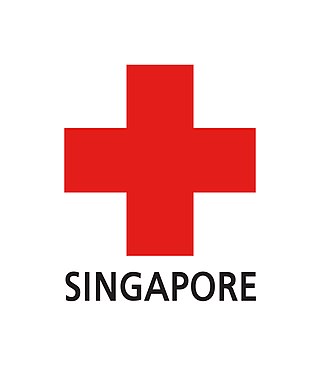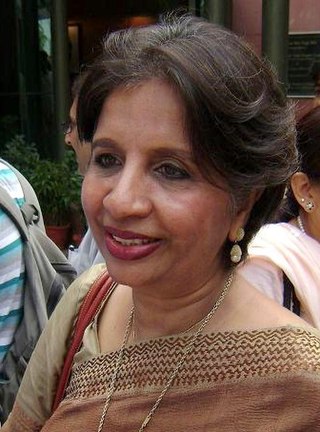
Goh Chok Tong is a Singaporean former politician who served as Prime Minister of Singapore between 1990 and 2004, as a member of the People's Action Party, he served as Secretary-General of the PAP between 1992 and 2004. He was the Member of Parliament (MP) for Marine Parade SMC between 1976 and 1988, and Marine Parade GRC between 1988 and 2020.

The Singapore Armed Forces (SAF) are the military services of the Republic of Singapore, responsible for protecting and defending the security interests and the sovereignty of the country. A military component of the Ministry of Defence (MINDEF), the armed forces have four service branches: the Army, the Navy, the Air Force, and the Digital and Intelligence Service. An integrated force, it is one of the most capable, robust, technologically sophisticated and powerful militaries in Southeast Asia and the surrounding regions. The SAF is headed by the chief of defence force, who holds the rank of a Lieutenant-General or Vice-Admiral, and is appointed by the president of Singapore.

On 26 December 2004, at 07:58:53 local time (UTC+7), a major earthquake with a magnitude of 9.1–9.3 struck with an epicentre off the west coast of northern Sumatra, Indonesia. The undersea megathrust earthquake, known by the scientific community as the Sumatra–Andaman earthquake, was caused by a rupture along the fault between the Burma Plate and the Indian Plate, and reached a Mercalli intensity up to IX in some areas.

The humanitarian response to the 2004 Indian Ocean earthquake of a magnitude of 9.1 was prompted by one of the worst natural disasters of modern times. On 26 December 2004, the earthquake, which struck off the northwest coast of the Indonesian island of Sumatra, generated a tsunami that wreaked havoc along much of the rim of the Indian Ocean. Particularly hard-hit were the countries of Indonesia, India, Sri Lanka and Thailand. About 230,000 people were killed, tens of thousands more were injured, and 1.7 million became homeless and displaced.

Indonesia was the first country to be seriously affected by the earthquake and tsunami created by the 2004 Indian Ocean earthquake on 26 December 2004, swamping the northern and western coastal areas of Sumatra, and the smaller outlying islands off Sumatra. Nearly all the casualties and damage took place within the province of Aceh. The time of arrival of the tsunami was between 15 and 30 minutes after the deadly earthquake.

A tsunami warning system (TWS) is used to detect tsunamis in advance and issue the warnings to prevent loss of life and damage to property. It is made up of two equally important components: a network of sensors to detect tsunamis and a communications infrastructure to issue timely alarms to permit evacuation of the coastal areas. There are two distinct types of tsunami warning systems: international and regional. When operating, seismic alerts are used to instigate the watches and warnings; then, data from observed sea level height are used to verify the existence of a tsunami. Other systems have been proposed to augment the warning procedures; for example, it has been suggested that the duration and frequency content of t-wave energy is indicative of an earthquake's tsunami potential.
The World Conference on Disaster Risk Reduction is a series of United Nations conferences focusing on disaster and climate risk management in the context of sustainable development. The World Conference has been convened three times, with each edition to date having been hosted by Japan: in Yokohama in 1994, in Hyogo in 2005 and in Sendai in 2015. As requested by the UN General Assembly, the United Nations Office for Disaster Risk Reduction (UNDRR) served as the coordinating body for the Second and Third UN World Conference on Disaster Reduction in 2005 and 2015.

The Singapore Red Cross (SRC), formally the Singapore Red Cross Society, is a humanitarian aid and community services charity in Singapore. The SRC is a national member of the Federation of Red Cross and Red Crescent Societies (IFRC) and International Committee of the Red Cross (ICRC) and forms a part of the International Red Cross Movement.
Following the devastation of the United States and Gulf Coast by Hurricane Katrina, Singaporean Prime Minister Lee Hsien Loong sent his personal letter of condolences to U.S. President George W. Bush while the Singaporean Foreign Minister George Yeo sent his personal letter of condolences to the U.S. Secretary of State Condoleezza Rice, promising support for the American people in their relief effort in the wake of Hurricane Katrina.
Anthony Banbury was appointed the President and Chief Executive Officer of the International Foundation for Electoral Systems (IFES) in 2018. He served as United Nations Assistant Secretary-General for Field Support until 5 February 2016. He resigned from this position, stating that the UN is in dire need of reform. Drawing on more than 20 years of experience with the UN, he criticized its sclerotic personnel system, a lack of accountability, insufficient impact and the UN's inability to deal with transgressions by its own staff.

Nirupama Menon Rao is a retired civil servant of 1973 batch Indian Foreign Service cadre who served as India's Foreign Secretary from 2009 to 2011, as well as being India's Ambassador to the United States, China and Sri Lanka during her career.
A tectonic weapon is a hypothetical device or system which could trigger earthquakes, volcanic eruptions, or other seismic events in specified locations by interfering with the Earth's natural geological processes. It was defined in 1992 by Aleksey Vsevolodovich Nikolayev, corresponding member of the Russian Academy of Sciences: "A tectonic or seismic weapon would be the use of the accumulated tectonic energy of the Earth's deeper layers to induce a destructive earthquake". He added "to set oneself the objective of inducing an earthquake is extremely doubtful." Though no such device is known to have been built, tectonic weapons have occasionally appeared as plot devices in works of fiction.
The humanitarian response to the 2010 Chile earthquake included national governments, charitable and for-profit organizations from around the world which began coordinating humanitarian aid designed to help the Chilean people.

The 2010 Mentawai earthquake occurred with a moment magnitude of 7.8 on 25 October off the western coast of Sumatra at 21:42 local time. The earthquake occurred on the same fault that produced the 2004 Indian Ocean earthquake. It was widely felt across the provinces of Bengkulu and West Sumatra and resulted in a substantial localized tsunami that struck the Mentawai Islands.

Eric Paul Schwartz is the current president of Refugees International and former United States Assistant Secretary of State for Population, Refugees, and Migration.
Sudjadnan Parnohadiningrat is a former Indonesian diplomat. He served as an official in the Indonesian Department of Foreign Affairs for over two decades.

Ryou-Un Maru was a Japanese fishing boat that was washed away from its mooring in Aomori Prefecture by the March 2011 Tōhoku earthquake and tsunami and drifted across the Pacific Ocean. It was spotted a year later by a routine Royal Canadian Air Force air patrol about 150 nautical miles off the coast of Haida Gwaii, British Columbia. The unmanned hulk entered U.S. waters on 1 April 2012, and, after salvage attempts failed, was sunk by the U.S. Coast Guard on 5 April 2012 to prevent the hulk from becoming a hazard to navigation.

Robert Andrew Piper is an Australian development aid coordinator for the United Nations. Between December 2018 and May 2022 he was Assistant Secretary-General of the United Nations Development Coordination Office. In May 2022, he was appointed Special Adviser to the Secretary General on Solutions to Internal Displacement. He is currently based in New York.
Mercy Relief is a non-governmental humanitarian organization in Singapore. The organization was officially launched in 2003, by the then-Deputy Prime Minister of Singapore, Mr Lee Hsien Loong, it seeks to promote a life of compassion, care and volunteerism.
On 4 May 2000 at 12:21 WITA, Banggai Islands Regency was hit by an earthquake of magnitude 7.5 , followed by a tsunami. The Banggai Islands, an archipelago located at the far eastern end of Central Sulawesi, Indonesia, was the worst affected by the earthquake. Eighty percent of Banggai's buildings were destroyed. Damage also occurred on Peleng. The earthquake triggered a local tsunami of up to 6 m in height that caused significant damage east of Luwuk on the mainland and on Peleng.











